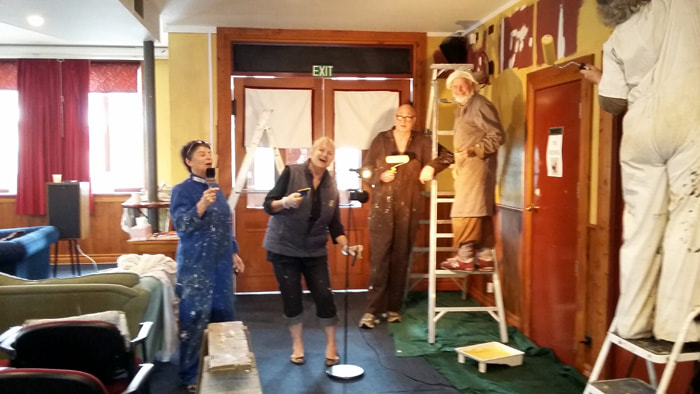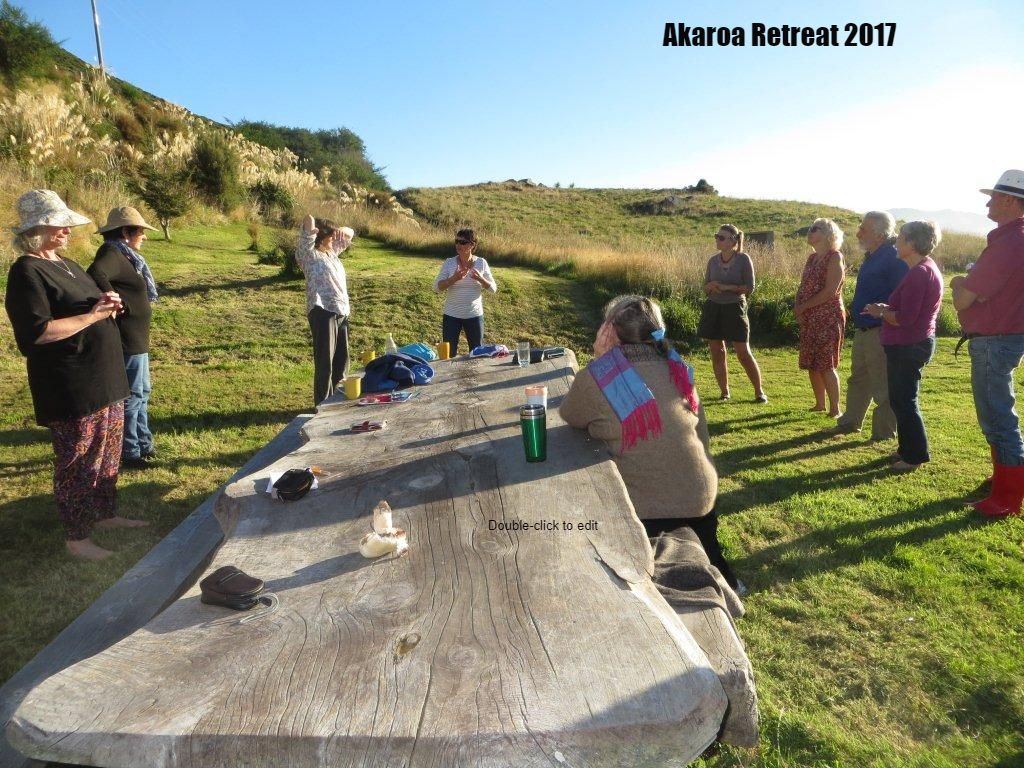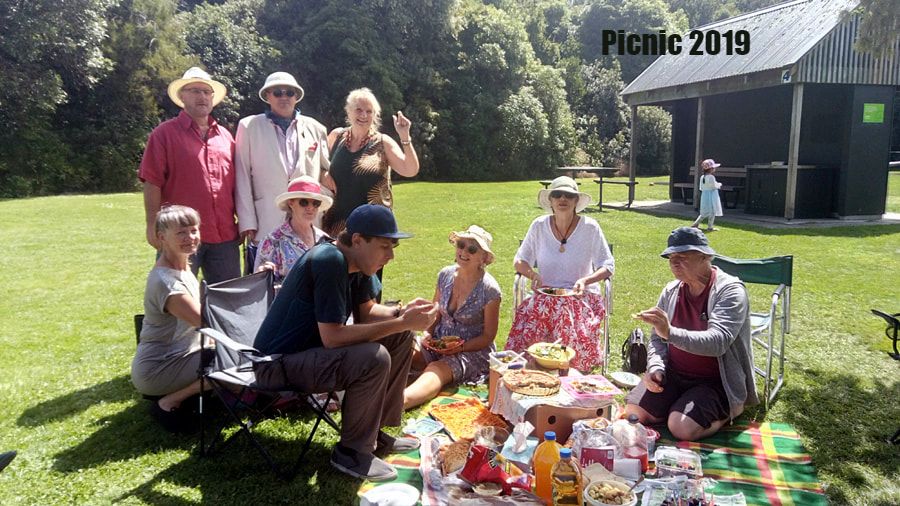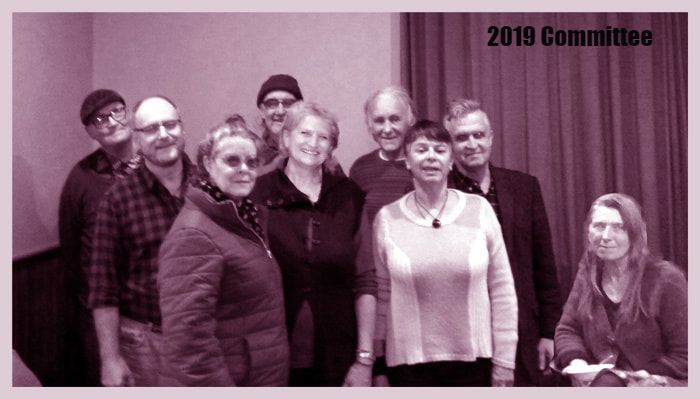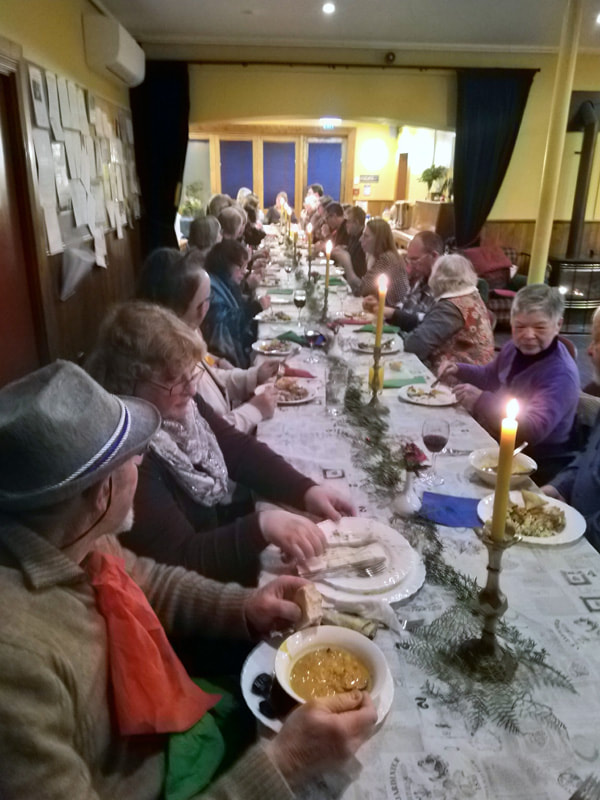OUR HISTORY
Dunedin theosophists ... have [sic always] been active seekers with diverse interests... reports Dunedin Lodge member Alistair McMurran as he shares..
The Dunedin Lodge of TSNZ was formed in 1893 and the Charter of the Dunedin Lodge was signed by the first International President, Colonel Olcott on 23 May 1893. Since then, many interesting and lively characters have been members and given service to the Dunedin Lodge of the society.
The Inglis and Pollard families were the most influential in the Dunedin Lodge last century. Mrs A. J. Pollard, their mother, was president and her daughters Cecilia and Truda Burrell also filled that role. Rose Pollard was a long time secretary and treasurer.
The most noted member of the Inglis family was Agnes, who was the acknowledged mystic of the lodge. She lived into the 1980s and wrote an unpublished history of the Dunedin Lodge that emphasised the influences of the Ascended Masters who formed the Theosophical Society in 1875. Her mother and sister were also members.
Agnes Inglis epitomises the different threads that have been part of the Dunedin Lodge history. She was an avid reader, psychic, occultist and the daughter of John Inglis who joined the lodge in 1901. Agnes was a long term secretary and librarian with sparkling eyes and a deep spiritual understanding. She was a member of the Lotus Circle, a Sunday school for children, that met weekly in Liverpool Street. Agnes Inglis knew that the Theosophical Society had to continually adapt and was never meant to stay in the Victorian era.
The Inglis family was helped by the Masters when little sister Annie died at nine months. "Dad brought home a theosophical book and mother read that a baby often comes back to the same family,'' Inglis wrote. She was uplifted and also helped by a great Adept (Indian) who appeared to her in the passage of their Maclaggan Street home. His eyes seemed to give great strength. Five years later she saw photos of these Adepts (Masters) who live in the Himalayas and she recognised her helper. Lex (Alexandrina Inglis) was born on 30 January 1903. "Mother knew before she was born that this was the same baby,'' wrote Inglis. Inglis was taught dancing and elocution as a member of the Order of the Round Table when growing up. "We had to prepare a talk. It was an effort speaking for five minutes on a single topic,'' she wrote.
The Round Table also emphasised service and part of her duty was to empty the ashes from three large fireplaces and set the fires ready to light for Sunday evening TS lectures. Inglis had a number of direct contacts with the Theosophical Masters and was once saved from serious injury when a large bookcase fell on top of her at the Theosophical Society building in High Street. "I did not speak about the voice of the unseen person whose advice saved me,'' she wrote, "I believe he was one of the Masters who helped form the Theosophical Society in 1875. They have clairvoyant vision and other occult faculties unknown to ordinary people.''
The Masters Kuthumi and El Morya and their assistants have influenced key decisions taken by the Dunedin Lodge. This influence is highlighted in the University of Otago history thesis by A. Y. Atkinson on The Dunedin Theosophical Society 1892 to 1900 that was published in 1978:
"One day travelling on the train from Sawyers Bay to Dunedin, Augustus William Maurais noticed that the elderly gentleman seated across from him was reading a theosophical magazine. Introductions were quickly made and the stranger proved to be Grant Farquhar, wealthy partner in the tannery factory at Sawyers Bay and a keen enthusiast on all matters theosophical.''
Maurais called a meeting to discuss the formation of the Dunedin Lodge in December 1892. It ended in disagreement between advocates of spiritualism and Maurais who considered the Wisdom Tradition the most important aspect of the society. The spiritualists were not invited to the meeting in February 1893 that started the Dunedin Lodge of the Theosophical Society in New Zealand.
Maurais, who had read deeply into the Wisdom Tradition, became the first secretary. His knowledge was necessary during the first decade when theosophy was viciously attacked from the pulpit by the famous Dunedin Presbyterian minister the Rev. Rutherford Waddell. Atkinson wrote: "Scarcely a day went by when the morning or evening newspapers did not print a letter written by a theosophist or one of theosophy’s critics.” (A large part of the correspondence centred around the scandals and frauds associated with theosophy.) "Maurais, writing in the Evening Star in 1894, pointed out that the body of knowledge itself was more important to theosophists than the beings, human or spiritual, who had conveyed it.'' However, on reading these old records, one comes to the conclusion that a great deal of what Jung calls synchronicity was taking place at the time. You could call it ‘the touch of the Master's hand’.
The visit by Annie Besant on her second visit to Dunedin in 1908 (she also visited the lodge in Dunedin in 1894) was a highlight for Agnes Inglis who wrote, "She came to our room in the Lotus Circle and sat behind the table by the window." Inglis wrote in her historical account, "She said, 'Please close the window. I must not get a sore throat as I have to lecture...’ Annie Besant spoke to us on good citizenship and told us to choose work to help the country and to keep our town beautiful and clean. At night the theatre was packed. Her voice was quiet at first, but grew stronger as she went on; her voice reaching a high pitch. Sometimes she stopped and you could hear a pin drop. She had no notes and spoke entirely from memory.''
The Dunedin Lodge had leasehold rooms in Dowling Street from 1914 but moved to a freehold property at 236 High Street in 1945 when the owners doubled the ground rent. "The introduction of television in the early 1960s caused our Sunday night audiences to dwindle so we changed the public meeting to a week night, thus breaking the habit that the lodge began in 1893,'' Inglis wrote. "We have to adapt to modern needs and understand what people need most along spiritual lines.''
Atkinson highlights the early members of the Dunedin Lodge as intellectuals with compulsive reading habits and breadth of outlook. "They were confident and possessed a tendency to deviate from the norm,'' Atkinson wrote in his thesis, "Maurais's desire for ‘back to nature self-sufficiency’ was an example of this.'' Long-term member Charles Burrell was another example of an active member with diverse interests. Each week he would swim from St Clair Beach through the surf to the off-shore White Island and back. He was a very fit man who had an ability to read people's minds.
New people have come into the lodge and shifted the thinking and activities. It has never been static. The lodge helps people gain skills and confidence. For example, the quiet and gentle Victor Nelson was aged 90 when he gave his first public talk. Nellie Huls, the president for 13 years during the late 1970s and 1980s, opened up the lodge and allowed the public to attend all meetings. It brought in new and vigorous people. Richard Botting, a natural healer, made a huge impact in the late 1980s and once gave a public talk on crystals without notes. Erika Bianca was a vigorous president during the 1990s who, with the help of others, changed the style of public meetings. Outside experts were invited to give public talks. This worked and the numbers at meetings increased and membership grew.
The president has always been a powerful person in the lodge. Their personality and ideas have shifted the emphasis and added to the vast complexity that is the Dunedin Lodge. Under Erika Bianca the move was away from pure intellectual pursuits to a wide variety of general interest topics. In Phil Philpot's reign as president in the first decade of the 21st century, the intellectual side of the lodge was emphasised Victor MacGill has introduced a consensus approach to his administration.
Lack of finance was a problem at this time and a lot of energy of the committee was spent on housekeeping duties and not on promoting theosophy. Philpot and former Australian Aelred Edmunds took the initiative and sold the building at the height of the property market boom. It was another example of the guidance of the Masters.
The Dunedin Lodge headquarters has been at the old RSA building in Moray Place for the last three years. The financial freedom from selling the High Street property enabled the lodge to set in place a vigorous weekly programme. The RSA building was owned by new life member Margaret van der Vis, who started the meditation group. It was sold when she shifted to a retirement village at Mosgiel with her husband. The new owner wanted to use the building for other purposes and the Dunedin Lodge had to find a new home.
The lodge moved to new rooms in the Upstart Building in Water Street in 2009. After five years there the lodge was able to buy the building at 469 Hillside Road (the former Fitzroy hotel at Bathgate park).
The last word of this history, belongs to Linda Hampton, the great granddaughter of John Inglis, who echoes the impact the Inglis family has had on the Dunedin Lodge over the last 100 years: "Perhaps we ought to ask the Masters what should be done [next].....They still have a hand in what the TS is – [we can] trust that their guiding hands will continue to show the way.''
Key Dates for the Dunedin Lodge:
1893 Dunedin Lodge formed (February). Charter signed by Colonel Olcott (May)
1893 Rented small room next to Jacobs Tobacconist 1894 Visit by Annie Besant (also 1908)
1897 Visit by Colonel Olcott
1900 to 1914 rented large room, John Reid's Building, Liverpool St and temporary rooms 1904 Lotus Circle opened and Round Table formed
1905 Visit by C W Leadbeater (also 1910, 1912, 1918)
1914-45 Leasehold property 17 Dowling St
1920 Mr G Richardson donated 2000 books to form library
1930 Visit by George Arundale and Ernest Wood
1931 First National Convention held in Dunedin
1945-2006 Freehold property, 236 High Street
1949 Visit by John Coats (also 1959, 1970)
1978 A.Y. Atkinson - BA Honours History thesis: Dunedin Theosophical Society (1892 to 1900)
2006-09 Rented room, RSA Building, Moray Place
2009 Rented room in Upstart Building, Water Street
2014 Bought new building at 469 Hillside Road, Caversham; ie former Fitzroy hotel at Bathgate P
Phil Philpot, the President of Dunedin Lodge (2000-2008).
When I first connected to the Society in Dunedin in 1983 there use to be an informal lunch meeting on Library open day. (Fridays, I think it was).
Miss Ingalls was still alive then, but I only met her a few times at the Library.
The main three families involved were the Tapolcais, (Janni and Josca) and the Huls, Nellie and Bill. Truda Burrell was also alive and attended some of the weekly Thesopsophical Meetings. Truda was a senior Co- mason and the wife of the last Liberal Catholic priest, Charles Burrell.
The Liberal Catholic Church was still set up in the building and occasionally a priest would visit and a Church Service would be held on a Sunday morning, but very rarely.
Nellie Huls was the President for many years, until Erica Bianca became President, in early to mid-90's.
The Programme was usually a study on a Theosophical Work and occasionally one of the senior lecturers from National would do a presentation....Gavin Laurie, Charles Sitwell, Bill Johnston and Murray Stentiford were four of the National Presenters.
Truda Burrell, sponsored me in the Liberal Catholic Church to become a Priest in training and I ran services on Sunday mornings for a few years until 1991/92. A devotional service with a sermon. Full Mass was only had, when we had a Priest visit.
Early to Mid 90's to 2000
I did not attend the Society much during this period as I was busy with University study, Career and family.
A friend of Erica Bianca was a builder and competent home handy person and they, with others put many hours and hours into doing up parts of the High Street premises as the building had had little maintenance for many years, though Bill Huls in the previous period had also done a lot of work.
The programme became more open, with a more new age perspective on subjects and some mediumship and investigation of psychic powers also took place. A wider selection of spiritualities were included with more guest speakers, mostly local, but some national were included. National TS still had senior speakers who would do presentations.
A lot of money was spent on trying to upgrade the old building during this period.
2000 to end 2008
I began my president-ship in 2000 and worked through until AGM 2008 when Victor MacGill took over the role.
Following Ericas period this was a very busy/active period for the Society.
My approach was to firmly base the programme in the 3 OBJECTS whilst introducing contemporary earth based spirituality and Hermetic studies currently being practiced in Western Spiritual paths.
The three declared Objects of the Theosophical Society are:
- To form a nucleus of the universal brotherhood of humanity, without distinction of race, creed, sex, caste or colour.
- To encourage the comparative study of religion, philosophy, and science.
- To investigate unexplained laws of nature and the powers latent in humanity
An e-and hard copy newsletter was produced by David Baird.
Other important committee members through that time were;
Margaret Van de Vis,
Betty McKewan,
Tracey Crampton-Smith,
Debbie Pratt
Victor MacGill
The Library began to be updated with books on the Western Occult path.
Spiritual Cinema was introduced by James Fox and myself.
High Street came to be viewed by many of us as a property that was too difficult to modernise and finally a decision was made to sell the property.
Through serendipity it happened to sell at the peak of a property cycle and these finances through James' careful superintendence kept the Society being able to rent good properties until the purchase of the Fitzroy Hotel.
A W (Phil) Philpot
Victor MacGill, the President of Dunedin Lodge (2008-2011)
Before being involved in the Theosophical Society I had been involved in the Spiritualist Church serving a term as their President. I knew of the Theosophical Society and had been asked to talk once or twice. I remember giving a talk on Spiral Dynamics in High Street when Phil was still the president. Ted Sommerville, who also came to the Spiritualist Church suggested I go along and before long I found my myself on the committee. By that time we were in the old RSA building owned by Margaret and Bill van der Vis. I heard Phil was not wanting to stand for a further term and so I put my name forward and became the President.
Margaret had her own style and many people will remember her "royal appearance" every meeting night when she would enter the room like the queen waving and greeting everyone. And then afterward most of us would go upstairs for Dutch treats, music, and a wonderful atmosphere. Eventually, Margaret and Bill moved to Mosgiel and we shifted to the Jetty Street building in the basement. Before we did that, however, Ted Sommerville passed away and we all came together to farewell him in our own way that I remember to this day.
Our full schedule of events continued and developed in the new building. We had weekly meetings with speakers, newsletters, discussion groups, libraries, Tai Chi/yoga groups, film nights and more. The mid-winter "Christmas" feast was a regular feature. We had funds invested after the sale of High Street and there was a balance of how to best use the funds to keep our program running while leaving enough for buying our own premises again in the future.
Being president meant regular trips to the HQ in Auckland and I enjoyed meeting Theosophists from around the country and gaining the national perspectives, although the politics were often intense. I was one of a long line of South Island presidents, who often found that our style of operating in the South had its own flavor, which was different from the north. The society had a strong culture of openness and exploring new ideas alongside the more traditional aspects of Theosophy. I remember James describing us as a railway station, where people would come and see the whole range of ideas and spiritual paths and go of on a journey, but come back and then select another train.
The sense of community was always strong and inviting and was a focus in the lives a quite a few members. That meant of course we had the differences to resolve that any vibrant community has and has maintained to this day.
The regional gatherings started from money allocated from the national budget for regions to use as they wished for their development. The first South Island Regional gathering was in Nelson and after that, we rotated each year between being organized by Nelson, Christchurch or Dunedin. We had gatherings at Gunns Bush, two at Hamner, Nelson Spiritualist Church, and two at Akaroa. They provided a great way for us to link regionally and develop our own South Island Theosophical culture."
Tracey Crampton-Smith, the President of Dunedin Lodge (2011-2014).
Tracey took the helm when the organisation was going through some very big changes at a national level and her presence at the meetings in Auckland brought back a lot of material back to Dunedin for enthusiastic debate.
She did manage to get the regional gatherings off the ground which meant that those from smaller branches could meet with those from the larger cities for a weekend of friendship, learning and fun. The South Island gatherings have been a huge success. A popular venue for meetings is Hanmer Springs.
Tracey brought her great knowledge of people in Dunedin to the Wednesday night talks. She introduced presentations containing everything from 'The Black Madonna' and spiritualists’ to rituals and paganism . Tracey along with Peter Mason found the Fitzroy Hotel in South Dunedin as a suitable site for the society as it would have enough rooms for renting and other activities. Tracey liked to rest her beliefs in paganism and after her presidency, went to run a pagan group in Dunedin.”
Ruth Lawson, the President of Dunedin Lodge (2014-2018).
On November 5th with fireworks, fire dancers and some trepidation we celebrated taking possession of the former Fitzroy Hotel. We had bought the building with the proceeds from our investment from the sale of our High Street Building which was providing a progressively dwindling income. It was a mortgagee sale and the previous owners had left us all the chattels including dirty dishes in the sinks and festering food in the refrigerators. We intended to rent out the rooms and commercial kitchen to provide our income but first some serious investment and hard work was needed. With the help of a loan from our national body we refurbished the commercial kitchen, and upgraded the upstairs bathrooms, kitchen and apartment. We held garage sales to get rid of the multitude of microwaves, table settings and beer jugs and organised working bees during which members painted almost every internal wall. We applied for grants to provide heating for our meeting rooms and Peter Mason, our building manager, donated hours of his labour and skill. So by the end of my presidency in 2018 we had a warm and well-appointed meeting area with its own kitchen, a library and 11 tenants who provided us with income. Throughout the upheavals our membership held steady at about 60 and our weekly programme of well attended public meetings, a study group, meditations and Qi Gong continued and were well supported. As always potluck communal meals were enthusiastically attended and a van load of members set off annually from Dunedin for the Southern Regional Gathering held at a central South Island location for 3 days of workshops and discussions with TS members from throughout the South Island. I would like recognise the wise counsel and hard work of the committee during this time. Vice president and Secretary: Ralf Schruba. Treasurer and Librarian: James Fox. Building manager: Peter Mason. Committee members: Marie Lloyd, Chris Young, Kerry Goodhew, Michael Rudin, and Paul McMurran. Ruth Lawson
Katarina Miscewy, the President of Dunedin Lodge (2018-2020)
Since we purchased the old Fitzroy Hotel in Helena St - South Dunedin many improvements have been made to the building with the help of our team of dedicated members: Ruth Lawson, James Fox , Peter Mason, Ralf Schruba, Marie Lloyd, Greta Doo, Chris Young, Paul McMurran and Tony Parry.
They put a huge effort in to make this building our home. We have been focused on a number of different projects to maintain and develop our facility - which included a number of working bees. Our Lodge supports the wider community by renting our space – when it is possible - to care organisations like the Community Care Trust and Senior Link. In addition, our upstairs rooms and outbuildings are rented to individual tenants who use them either as their place of residence or for work space , for example as an art studio. Our commercial kitchen is leased by a ‘food truck’ business. Our Lilliput Library (free book exchange service) attached to the outside of our building remains popular among South Dunedin and Caversham residents.
The wide variety of topics presented at our Wednesday Meetings - by our members, supporters and the invited guests stirred up much interest and discussion with approximately 15-25 attendees including public participants. The Wednesday Study Group (held immediately before our Wednesday talk) has approximately around 7 regular attendees. Each week we have Qi Gong, a meditation class and social evening.
Our guests are national and international speakers including John Vorstermans, our National president. To mark our 5th Anniversary of buying the building in Caversham – we had a very successful and well attended weekend event with invited guests from Auckland and Wellington.
Our committee members travelled to Auckland to attend the National AGM. They were also present at a Theosophy Immersion Weekends - held in Napier and a year later in Hamilton.
The group of our members were present at the yearly event, The Southern Regional Gathering that was held at Gunn’s Bush camp near Waimate, organised by Nelson branch. This is always an occasion for a wonderful exchange of ideas and experiences for TS members of South Island.
Our weekly activities were unexpectedly cancelled on the 23th of March 2020 because of Covid-19 epidemic. Our country, like most of the world went into lockdown. They were challenging times for all of us but our members bravely survived these unprecedented times. We opened again in June and at the end of that month we organized Mid-winter dinner with the huge number attending. It was a great occasion to de-stress and catch up with friends after the Covid-19 upheaval. Dunedin Lodge has always a distinct character and vibrancy, and true community feeling
